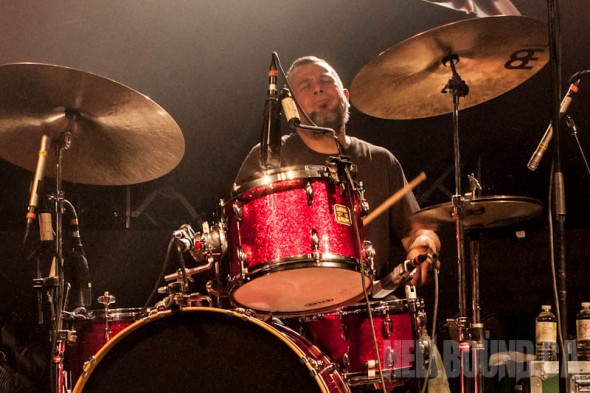By Jonathan Smith
Let’s begin with a confession: I’m not what anyone would call a Motörhead fan. Nothing personal against the band or anyone involved with it. I’ve always particularly enjoyed Lemmy as an entertaining figure in documentaries. Motörhead has just never been my preferred class of metallic music. That said, even though I’ve traded in many a CD over the years, I’ve always hung on to my copy of 1981’s No Sleep ‘Til Hammersmith.
Live albums can be quite divisive. Some people like them, some people hate them. For myself a good live album is always one that invokes the experience of a band playing live. It’s actually irrelevant whether said live album is an actual recording of a single concert, or whether it is cobbled together from many tour stops and/or altered in post-production. What’s important is that it feels like a souvenir of a live show. Iron Maiden’s Live After Death is one such album, a recording that made me a Maiden fan and showed me what they could do on the stage. Kiss’ Alive III is another example. I would argue that Motörhead’s pivotal live album does the same job.
No Sleep ‘Til Hammersmith begins with a blasting version of “Ace of Spades.” It’s a cut worth putting on repeat before moving on to “Stay Clean.” Things slow down as the band shifts gears, slowing down for the intro to “Metropolis.” Those first three tracks are, in a row, some of the finest live music I’ve ever heard committed to recording. Later cuts such as “Capricorn,” “Overkill,” and “Bomber” make for an especially energetic second half. Together they all remind listeners that Motörhead is an apt name for the combination of Lemmy, Eddie Clarke, and Philthy Taylor, as their combined sound is like the naked workings of continually faithful machinery. And that was 30 years ago.
When listening to No Sleep ‘Til Hammersmith, it’s clear that it isn’t a single, untouched concert. There are obvious moments where the crowd’s cheers are abruptly cut off as a new song begins. It can’t help but feel appropriate for a Motörhead album; too much polish and alteration and the experience would feel dishonest. The rougher transitions embody the way that Motörhead lay everything out for all to see (hear). “(We Are) The Road Crew,” a tribute to the behind-the-scenes antics and endless tasks that make up a rock ‘n roll tour, only further emphasizes the band’s presentation of themselves as breaking down the wall between performer and roadie, artist and technician. It’s that lack of mystique, that absence of theatrics, which allows for Motörhead’s music to charge to the forefront. Far superior to any “greatest hits” collection of studio cuts, No Sleep ‘Til Hammersmith is one of the best ways for the curious metal fan to re-experience, or experience for the first time, the band in their element.
(Bronze Records)


